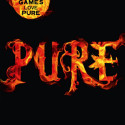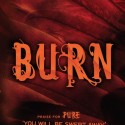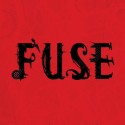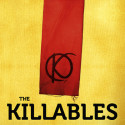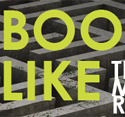Julianna Baggot, author of Pure, speaks to ThirstforFiction!
Today, I’m happy to welcome Julianna Baggott, author of the astonishing new post-apocalyptic tale Pure, to ThirstForFiction. She’s the author of several books and Pure is her first YA novel. Follow her on Twitter: @jcbaggot
 ThirstforFiction: For those who haven’t read Pure, tell us a little about it.
ThirstforFiction: For those who haven’t read Pure, tell us a little about it.
Julianna Baggott: Pressia is a 16-year-old living with her grandfather in the back of a demolished barber shop, having survived the detonations and existing in a post-apocalyptic world that’s scarcely populated with those scarred, burned, fused and warped — a strange, ashen, otherworldly world. Pressia is a girl who has to hid in a cabinet — a girl with a doll-head fused to her fist.
Partridge is a Pure. He lives in the Dome with his powerful father. He finds out that his mother may still be alive — on the outside — and as he escapes the Dome to find her, his life and Pressia’s collide. Steven Schneider (producer of Paranormal Activity) calls it “a post-apocalyptic thrill ride,” and Robert Olen Butler (Pulitzer Prize winner) calls it “the most extraordinary coming-of-age story” he’s ever read. I hope both are true for readers.
T4F: Dystopian/post-apocalyptic fiction is getting more popular in YA. Where you aware of this when you started writing Pure?
Of course, I knew about The Hunger Games early on, but I didn’t have any idea that it was a solid and growing genre. These characters appeared many years ago in very different forms and even genres — they kept coming back and expanding until the novel turned into world-building.
T4F: The ‘dome’ subject has been used a lot of sci-fi and post-apocalyptic novels. Although Pure is entirely different to any other novel I’ve read with the ‘dome’ concept, wasn’t it a little risky using an established idea?
Honestly, I come from the magical realism branch of literature — not sci-fi/fantasy, and so the Dome concept didn’t strike me as risky. The idea of having a character with birds embedded in his back? That was very Marquez-inspired and  felt more dangerous. Basically, I’ve ended up braiding a lot of traditions, not being rigorously true to the rules of any one of them in particular. I felt may way into the world with my hands out in front of me, into the dark.
felt more dangerous. Basically, I’ve ended up braiding a lot of traditions, not being rigorously true to the rules of any one of them in particular. I felt may way into the world with my hands out in front of me, into the dark.
T4F: You’ve written several adult novels under pen-names. Why do you use these pen-names?
I’m prolific. The pen names allow me to keep writing and to move through genres and build audiences.
T4F: Pure is your first Young Adult novel. Are there any things your consciously change in your writing to cater for younger audiences?
Technically, it’s YA-adult crossover and went out to both adult and YA editors. In the end, I chose an editor at an adult publishing house because I thought she was the right match for the trilogy — creatively. I wasn’t thinking about markets and branding and what part of the bookstore I might find a shelf. I did, however, write the novel for my daughter — now sixteen — and so, yes, I was aware of her while writing this, urgently so.
T4F: Pure is filled with a great deal of fantastic characters. How do you go about creating new characters, and do you ever base any off of yourself or people around you?
I only have the world around me mixed with my imagination and so, yes, I take small elements of people I know, relationships I have, and those things churn in my subconscious. They never come out the same.
T4F: I know authors hate this question- but what inspired you to write Pure? I haven’t read any of your previous novels but it sounds very different.
It is wholly and completely different, but every word I’ve ever written led me to PURE. I had these characters floating in my mind. I wrote a few pages one day — a girl who has to sleep in a cabinet, a girl with a doll-head fist … I read them to my daughter. She’s a hostile reader. She told  me that it was the best thing I’d ever written and that I had to write the book. She kept pushing me back to it. So, yes. She inspired me to start and keep going.
me that it was the best thing I’d ever written and that I had to write the book. She kept pushing me back to it. So, yes. She inspired me to start and keep going.
T4F: Did your childhood shape you as a writer?
Absolutely. I was odd and imaginative and lived in my head a lot. My parents took me to a lot of plays — good and bad. I soaked it in. I’m still writing the things that have haunted me from the very beginning. Also, my father was a double-amputee from WWII. He lives a few blocks away. The grandfather in this book exists because he was a huge part of my childhood and my early notions on the effects of war.
T4F: Do you enjoy writing or is it something you are compelled to do? What is a typical writing day like?
I’m compelled. I love certain aspects of the craft. I loathe others. But I can’t imagine not having those other worlds to dwell in. Writing other characters is the daily practice of empathy. I hope that it’s made me a better human being.

